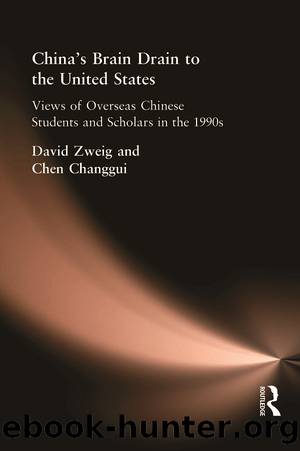China'S Brain Drain To Uni Sta by David Zweig Chen Changgui

Author:David Zweig, Chen Changgui [David Zweig, Chen Changgui]
Language: eng
Format: epub
Tags: Social Science, Ethnic Studies, General, Regional Studies
ISBN: 9781135903701
Google: hIsuAgAAQBAJ
Barnesnoble:
Goodreads: 19149654
Publisher: Routledge
Published: 1996-04-01T00:00:00+00:00
Economic Variables
A critical assumption behind this study was that in 1993, four years after Tiananmen, economics, more than politics, would be the driving force behind many people's decisions about not returning to China.9 We believed that as people compared their current or anticipated economic situation in the United States to their potential economic situation in China, they would decide that the economic gap was too great and so would opt to stay. We believed that as the political aftershock of Tiananmen receded, economics would be the most important determinant. We believed that if people's economic conditions in the United States were really disastrous, more might consider going back, especially if economic conditions in China improved. As we look at the data, we cannot say that economics is the most important factor; nevertheless, it looms very large in people's calculations about staying in the United States.
We first sought data about peoples' economic conditions in the United States under the assumption that if people were doing well, they were more likely to stay. First, we found that conditions were mixed; some people were living rather well, while others were just scraping by. But perceptions often were better than the real conditions. For example, when we looked at people's housing, we found that only 7.7 percent owned their own housing, and only 21.6 percent lived in anything as large as a two-bedroom apartment. The others (66.3 percent) lived in a one-bedroom apartment (29.7 percent) or a studio (21.6 percent) or shared a room in a house or apartment (15 percent). The mean rent people were paying was $390.00. Yet when asked how they would compare their housing in the United States to their housing in China, 39.2 percent saw their housing as "much better," while another 26.0 percent thought their housing was "a little better." Thus almost two-thirds of our sample believed that they had improved their housing.
In terms of total family income, the Chinese students and scholars in our sample are doing relatively well, with a mean income of $20,000$25,000 per family (see figure 2). Of the 262 cases for which we have data, 20.9 percent of the sample's total household income was less than $10,000 and another 32.4 percent earned $10,000-$20,000. Therefore, almost half (46.7 percent) of the households in our sample made more than $20,000, with 32.4 percent of the sample earning pretax total household incomes of more than $25,000. As the sample includes a significant number of single graduate students who are getting by on part-time jobs, as well as families who are relying on the labor of one adult while the other goes to school full time, this group is doing quite well and has strong economic incentives for staying in the United States.10 Moreover, when asked to describe their "overall living standard," 52 percent thought that it was "good" (38.8 percent) or "excellent" (13.2 percent), 37.4 percent that it was "average," leaving just over 10 percent who felt that it was "comparatively poor" or "very poor." When
Download
This site does not store any files on its server. We only index and link to content provided by other sites. Please contact the content providers to delete copyright contents if any and email us, we'll remove relevant links or contents immediately.
Canadians by Roy MacGregor(1460)
Chris Chelios by Chris Chelios(1413)
109 Walks in British Columbia's Lower Mainland by Mary Macaree(1299)
I Hear She's a Real Bitch by Jen Agg(1214)
From the Tundra to the Trenches by Eddy Weetaltuk(1184)
Stone by Stone by Liz Bryan(1177)
Berlin Travel Guide by Lonely Planet(1176)
Liquor, Lust and the Law by Aaron Chapman(1162)
Germany Travel Guide by Lonely Planet(1154)
Moon Atlantic Canada by Andrew Hempstead(1116)
105 Hikes in and Around Southwestern British Columbia by Stephen Hui(1094)
The Prince by unknow(1067)
Wine by Rod Phillips(1063)
Uncle John's Bathroom Reader Plunges into Canada by Bathroom Readers' Institute(1059)
1,000 Places to See in the United States & Canada Before You Die by Patricia Schultz(1059)
50 Best Girlfriends Getaways in North America by Marybeth Bond(1050)
How to Move to Canada by Terese Loeb Kreuzer Carol Bennett(1035)
DK Eyewitness Top 10 Travel Guides Montreal & Quebec City by DK(1031)
Hidden Ontario by Terry Boyle(1003)
